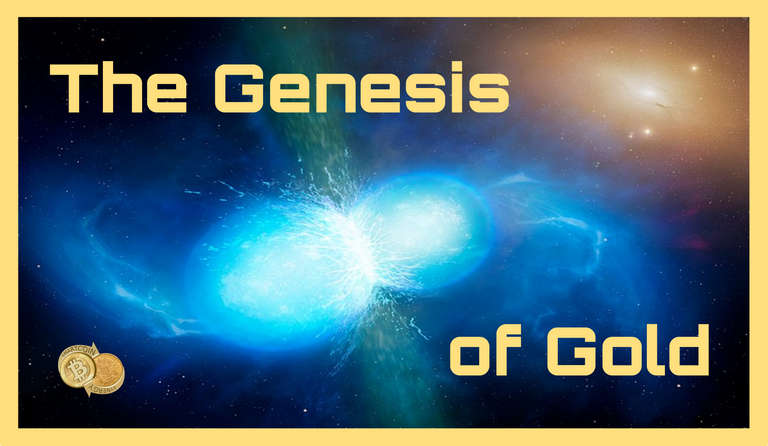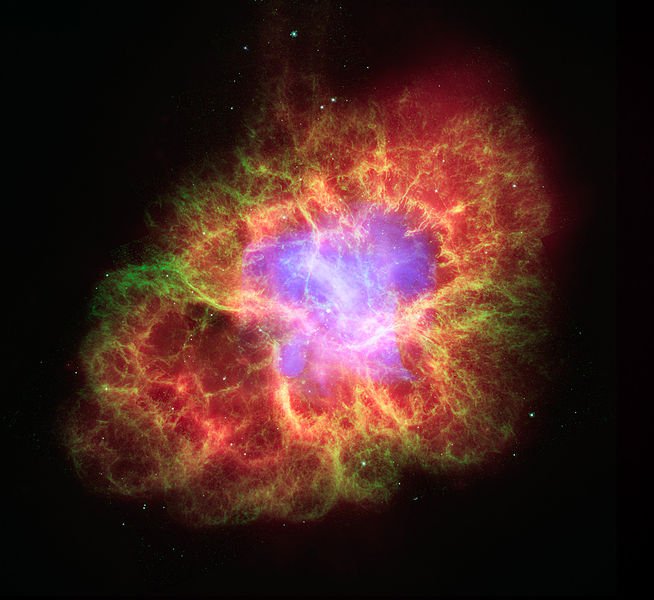The Genesis of Gold / Die Entstehung des Goldes


The Super Nova theory
A star produces temperatures of 10 million degrees during its lifetime, enough to produce elements as heavy as iron. For the formation of elements with a higher atomic number, which also includes gold, require much higher temperatures / more energy. The necessary thermal conditions are found when a star explodes after its lifetime expires. For a long time, we assumed that all gold in space was produced by Super Novas. In computer models, however, it was possible to prove that only little gold was created here. So there must be another phenomenon in space where larger amounts of gold are thrown into space.
Die Super Nova Theorie
Ein Stern erzeugt während seiner Lebensdauer Temperaturen von 10 Millionen Grad, das ist ausreichend um Elemente so schwer wie Eisen entstehen zu lassen. Für die Entstehung von Elementen mit einer höheren Ordnungszahl, zu denen auch Gold gehört, braucht es jedoch weitaus höhere Temperaturen bzw. mehr Energie. Die notwendigen thermischen Bedingungen findet man vor, wenn ein Stern nach seiner Lebzeit explodiert. Lange Zeit hatte man daher angenommen dass alles Gold im All durch Super Novas entsanden ist. In Computermodellen konnte jedoch nachgewiesen werden, dass hierbei nur wenig Gold entseht. Es muss also noch ein anderes Phänomen im All geben bei dem größere Mengen Gold ins All geschleudert werden.
The neutron star collision theory
A process in which even more energy is released than in the supernova is the collision of two neutron stars. This causes so-called gamma-ray bursts that last only a few milliseconds but generate temperatures of up to 100 billion degrees. That's about 10,000 times hotter than the sun. Enough to produce more gold than a regular supernova.
Very interesting here is that such collisions are extremely rare and one can assume that gold also only rarely occurs in space. To make such a collision happen, we need two supernovae so that neutron stars can arise, and their tracks must then also cross in other to collide. If we consider that neutron stars only have about 10-20 km, therefor collisions are highly unlikely.
Die Neutronen Stern Kollisions Theorie
Ein Prozess, bei dem noch mehr Energie freigesetzt wird als bei der Supernova ist die Kollision zweier Neutronensterne. Dabei werden sogenannte Gammastrahlungs Ausbrüche ausgelöst die zwar nur einige Millisekunden dauern, aber Temperaturen von bis zu 100 Milliarden Grad erzeugen. Das ist etwa 10.000 mal heißer als die Sonne. Genug um größere Mengen Gold entsehen zu lassen als es bei einer gewöhnlichen Supernova der Fall ist.
Sehr interessant hierbei ist, dass solche Kollisionen extrem selten sind und man davon ausgehen kann, das Gold im All ebenfalls nur selten vorkommt. Denn damit es zu so einer Kollision kommen kann, brauch es erst zwei Supernoven um zwei Neutronensterne entstehen zu lassen. Darüber hinaus müssen sich ihre Bahnen kreuzen sodass es zu einem Zusammenprall kommen kann. Sehr unwahrscheinlich wenn man bedenkt, dass solche Neutronensterne nur ein Durchmesser von ca. 10 – 20 km haben.
How did gold get on the earth or in the earth's crust?
The next question that arises is, how is this valuable extraterrestrial cargo coming to Earth? To understand this, one must go back billion years, where the earth was still a protoplanet. At that time the surface of the earth was not as it is today, it was liquid or gaseous and its temperature was very high. Also, there was no athmosphere, so that asteroids and meteorites containing gold could hit unhindered in the earth. These were pulled in the core of the young earth at impact. The formation of the moon and the associated reduction in the rotation of the Earth's axis, made the precious metals (contained in the mantle) reach the earth's crust. Tectonic tensions (formation of the mountains) and volcanic activity (hot springs) have promoted gold further up.
Wie kam Gold auf die Erde bzw. in die Erdkruste.
Die nächste Frage, die sich stellt, Ist, wie kommt diese wertvolle extraterrestrische Fracht nun auf die Erde? Hierzu muss man Milliarden Jahre zurück in die Vergangenheit gehen als die Erde noch ein Protoplanet war. Die Oberfläche der Erde war damals nicht beschaffen wie heute, sie war flüssig bzw. gasförmig und ihre Temperatur war sehr hoch. Auch gab es noch keine Athmossphäre, so dass goldhaltige Asteroiden und Meteoriten ungehindert in die Erde einschlagen konnten. .Diese wurden beim Aufschlag auf die Protoerde, in deren Kern gezogen. Erst die Entstehung des Mondes und die damit verbundene Reduzierung der Rotation der Erdachse hat dazu geführt, dass die im Erdmantel enthaltene Edelmetalle in die Erdkruste gelangen konnten. Tektonische Spannungen (Entstehung der Berge) und vulkanische Aktivität (Heiße Quellen) haben Gold noch weiter nach „oben“ gefördert.


Sources/Quellen
- https://www.welt.de/wissenschaft/umwelt/article160307932/Wie-entsteht-das-kostbare-Gold.html
- http://www.astronews.com/news/artikel/2006/03/0603-024.shtml
- https://de.wikipedia.org/wiki/Mond#Entstehung_des_Mondes
- https://www.welt.de/wissenschaft/article12242367/Das-Raetsel-vom-riesigen-Goldvorkommen-der-Erde.html
- videos in article
Sehr sehr interessanter und informativer Beitrag! Wirklich!
Ich selbst finde das Thema Astrophysik unheimlich spannend und lass mir kaum eine Reportage entgehen :)
Dieser Beitrag wird direkt auf meinem Feed geteilt.
Grüße aus Stuttgart,
Stefan
P.S. ein upvote sowie einen neuen follower ist mit diesem Beitrag auf jeden Fall verdient!
You have received an upvote from STAX. Thanks for being a member of the #steemsilvergold community and opting in (if you wish to be removed please follow the link). Please continue to support each other in this great community. To learn more about the #steemsilvergold community and STAX, check this out.